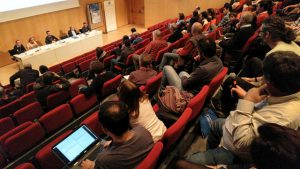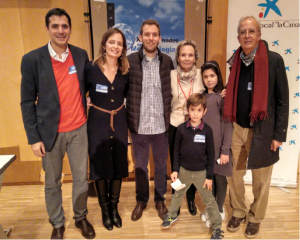XXIV Eduard Fontserè Symposium on Meteorology

About 140 people attended the XXIV Eduard Fontserè Meteorological Conference on December 1st 2018. This one-day meeting was organised by the Catalan Meteorological Association (ACAM) and dealt with the topic of biometeorology – a broad theme that had not been addressed before at an ACAM conference.
The event began with an inauguration by the recently appointed Director of the Catalan Meteorological Service (MeteoCat), Eliseu Vilaclara. Nine oral presentations, grouped in three blocks, were scheduled for the event. The first of these focussed on conceptual topics concerning biometeorology, and was delivered by Dr Pablo Fernández, President of the International Biometeorological Society and Professor at the University of Cantabria. He explained what biometeorological science is and described current research in the area. The second speaker was Dr Andreas Matzarakis, from the Deutscher Wetterdienst (DWD), who described different theoretical models used to quantify thermal comfort, and their applications in urban areas including a focus on Barcelona.
The second block of talks was dedicated to human biometeorology. In the first of these Dr Albert Duran of the Hospital of Santa Creu i Sant Pau in Barcelona and Dr Juan Carlos Peña of the Catalan Meteorological Service presented research on how to determine the relationship between Takotsubo’s disease and sudden changes in temperature and atmospheric pressure. Dr Javier Martín Vide, from the University of Barcelona, explained the effect of the Barcelona heat island on human health, especially the impact of minimum temperatures. His talk highlighted a proposal that meteorological services should issue an alert in so-called “torrid night” situations, i.e. nights with a minimum air temperature greater than 25ºC, due to the risk that such conditions may have on human health. The last of the presentations in this block was delivered by Dr Emilio Martínez, from the University of Granada, who described how tourism and meteorological/climate conditions are closely related.
The final section was devoted to animal and vegetation biometeorology. The first presentation dealt with forecasting cereal production by using meteorological conditions in Castilla y León (a region of Spain). This talk was delivered by José Ignacio Villarino, from the Spanish Meteorological Agency (AEMET). Phenological observations by Josep Borrell and analysis by Muntsa Bustos from the Catalan Meteorological Service was the topic of the second presentation. The last two presentations dealt with the modelling of water balance in forests and its impact on productivity and sudden droughts in ecosystems. These talks were by Dr Miquel Cáceres of the Center Tècnic i Forestal de Catalunya and Dr Jofre Carnicer of CREAF and the University of Barcelona respectively.
In addition, seven posters were presented during the coffee breaks, and served to establish contact between researchers and those attending the conference.
ACAM Medal of Honor to Dr Maria Rosa Soler

A novel component of this conference was the awarding of the inaugural ACAM medal of honor to a someone who has excelled in the field of meteorology/climatology. This initiative aims to publicly recognise people who, due to their scientific or academic background or for another reason, deserve recognition by the ACAM scientific community. The person honoured was Dr Maria Rosa Soler, who worked in the Department of Astronomy and Meteorology at the University of Barcelona. Dr Soler is recognised for her pioneering work in the fields of micrometeorology and boundary layer meteorology.
By Dr. Jordi Mazon Bueso, ACAM


Kommentare sind geschlossen.